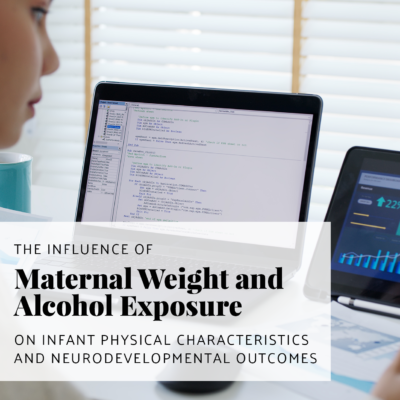A new study from NRI scientists, Julie Hasken, PhD, MPH, and Philip May, PhD, published on ScienceDirect in May 2022 examines the influence of maternal weight and alcohol exposure in infant physical characteristics and neurodevelopment outcomes. Dr. Hasken was the first author, and Dr. May was the principal investigator of the NIH-funded grant and the senior author.
Mothers of children with fetal alcohol spectrum disorders tend to have lower weight compared to other mothers. Yet how alcohol and maternal weight may predispose infants to poorer physical growth and neurodevelopmental trajectories is relatively unexplained.
Fetal alcohol spectrum disorders (FASD) are a group of conditions that can occur when a person was exposed to alcohol before birth. Conditions include growth deficiencies, physical anomalies and cognitive, behavior, and learning impairments.
In this new study, South African mothers were recruited while pregnant and their offspring were provided standardized dysmorphology (the study of congenital structural malformations or anomalies, commonly called birth defects) and neurodevelopment examinations at 6 weeks and then again at 9 months of age. Maternal weight was recorded postpartum. Through linear modeling, scientists were able to determine whether postpartum maternal weight and prenatal alcohol exposure significantly influenced infant growth, dysmorphology, and neurodevelopment within the first year of life.
The results of the study found that postpartum maternal weight was positively associated with birth length, weight, and head circumference centile, but the rate of growth from birth to nine months was similar among all infants. Maternal weight was inversely associated with dysmorphology. Many infants in this population were performing within the borderline or extremely low range. Higher maternal weight was associated with significantly better cognitive and motor performance at 6 weeks; however, the rate of developmental growth was similar among all infants, regardless of postpartum maternal weight.
In conclusion, in certain populations higher postpartum maternal weight may be a protective factor but does not eliminate the adverse effects of alcohol on infant growth and dysmorphology. Regardless of maternal weight, alcohol remains a powerful teratogen and moderate to high use prenatally can result in adverse infant physical and neurocognitive development.
Learn more about this study here.

